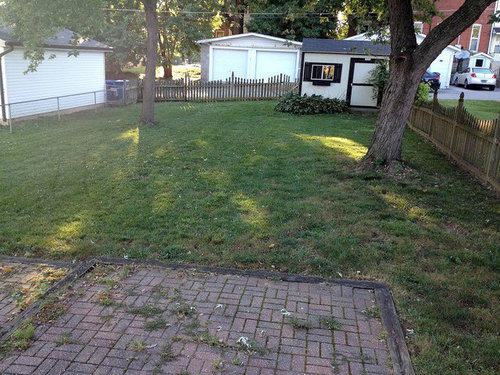Advice on aerating lawn - should I hire? Can I do it? Should I buy?
dosstx
8 years ago
Featured Answer
Sort by:Oldest
Comments (37)
darktower00844
8 years agoRelated Discussions
What's killing my new lawn, and what should I do about it?
Comments (1)1) Can you confirm this is a lawn fungus? Pattern has been, grass gets a dry area and then develops the yellow color of doom. Mostly this happened in a handful of places the irrigation doesn't cover too well. I'm not an expert at disease in northern lawns, but if I had those spots in my St Augustine I would declare it a disease. 1) What is the best path forward from here? Just hope and wait the fungicide works? Am I watering too much/too little? Can I over fungicide? Can I go get immunox and double down or will that kill the grass? You can absolutely overuse fungicide. As far as I'm concerned you already have. To my belief using a fungicide is like poisoning your soil, so I stay away from it. Why? Because most of the beneficial microbes in your soil are fungi. Best path depends on the watering issue. Are you watering too much or too little? You'd have to tell us how much you're watering to help us with an answer to that. How often do you water and for how long? If you are still watering multiple times per day, as if this were just installed, then you're watering too much. That would be my suspicion. Transitioning from new install watering to mature turf watering can be tricky. At this point if you are watering more than once every 10 days to 2 weeks then I'd be suspicious of too much water. Put some cat food or tuna cans in the yard and turn on the sprinklers. Time how long it takes to fill them. That's how long you should be watering. 2) Is the yellow grass a goner? At this point in time I'm planning on having to resod a handful of places come September, but if it'll come back on it's own I'd be very happy. Agree. Adjust your watering for now and resod selected spots at your leisure. Boston area is a forgiving climate for new grass, unless you got bad advice on watering the new grass....See MoreHow often should I water my Peace Lily & what else can I do for it?
Comments (10)That PLs are usually found in riparian settings (streamside or in boggy environments) where they naturally occur is absolutely no cause to believe they will do well in boggy soils. They adapt well to various types of water culture, and perform very well in fast-draining, well-aerated soils, but should be expected to perform poorly when asked to make the transition in soils from lengthy periods of significant saturation to times when the soil has dried down and become reasonably well-aerated and more hospitable to the plant. The reason, as has been pointed out, is the fact that the plant will grow roots structured to allow the plant to deal with one or the other set of conditions, but not both in a cycle that starts with a long period of saturation transitioning to the more appropriate moist (rather than wet or soggy) medium. How well a soil drains is determined almost exclusively by the size of the particles it is comprised of. While the arrangement you have with the pot sitting above the effluent in the collection saucer is commendable, it has no impact on how well the soil drains or its level of aeration. 1. How often should I water? Intervals will vary with season, light load, amount of air movement, ....... Unless you use a soil that allows watering on a schedule as opposed to on an 'as needed' basis, and yours doesn't, you should absolutely stick to watering only when the plant gets dry to the point it needs water. In fact, in spite of the stress it would create, it would actually be better if you waited for this plant to exhibit signs of the first stage of wilt before you water than to water before the plant need it. I'm not advocating using drought stress indicators to signal the plants need for water - just trying to establish a feel for the idea that a little under-watering is less limiting than over-watering. For this plant, marking your watering date on the calendar and OCCASIONALLY waiting for the first signs of wilt to establish appropriate intervals between waterings is a reasonable strategy. If you'd rather, buy a wooden birch dowel rod (1/4 or 5/16") from a hardware or big box store. Cut into appropriate length pieces for your plants, sharpen the ends with a pencil sharpener, and use the pieces stuck deep into the pot as 'tells' that will let you know the moisture conditions deep in the pot. If they come out wet or stained dark from wet soil, withhold water until they come out clean. MUCH better than "watering gauges/meters". 2. What else can I do for this plant? The answer to that could easily fill a book. You could try reading this (click on link). I read someplace that liquid fertilizer once a month is good too. Yay or nay on that? To be meaningful, any advice regarding frequency of fertilizer applications has to take into consideration your soil choice and watering habits. For example, if you water in small sips to avoid your MG soil remaining soggy too long, a one month interval at the regular rate is an automatic problem for more than one reason, and the type of fertilizer as well as its NPK %s both play a part in determining the criticality of the issue. If you're using a soil that allows you to water at will w/o the need to fear consequences centering on the fact the soil will be saturated for a length of time measured in weeks, you can actually fertilize at low doses every time you water, which is how I choose to fertilize all my plants during the winter. One type of soil (those that are very water-retentive, like yours) make it almost impossible to maintain control over effective nutritional supplementation; other types of soil that support little or no saturation make establishing and maintaining a sound supplementation program monkey easy. Al...See MoreWhere can I buy Quadra in US. Should I get Rambling Red instead
Comments (22)Mila - sounds like you have a plan, and I know what you mean about not wanting to wait to follow through on your plan. There's always room for more roses if you get creative! Glad the pictures helped you get tempted - they're all great climbers and you can't go wrong with any of the three you mentioned. Summers - for sure you'd have to finagle a way to attach the canes to the trees, and that's getting way too close to Quadra for my skin's sake. He's big and thorny, and between two trees he'd be just waiting to pounce. For sure you'd need another kind of support in addition to the trees, or he'd be flopping on your other roses as you mention. I used to grow my Quadra as a free-standing bush and he was at least 7' wide and aggressive with space. Can you stretch some sort of trellis or arch between the trees for extra support? He might not bloom as much in part shade beneath trees, but I'm all for giving it a try if that's where he is. I have Veilchenblau beneath a huge oak tree and it's pretty impressive (though it doesn't want to climb). Cynthia...See MoreShould I core aerate my new lawn?
Comments (7)Your soil looks fine to me, no need to add more on top. You need to cut lower, as low as your mower will allow - aka scalping. The current grass will happily take advantage of the water and starter fertilizer you put down for the seed and grow quickly smothering the seedlings. You will also find the grass will be so tall you will need to mow in about a week, which means trampling all over the seedlings when they've just germinated....See Moredanielj_2009
8 years agoUser
8 years agolast modified: 8 years agoshemmy98
8 years agodanielj_2009
8 years agodchall_san_antonio
8 years agodchall_san_antonio
8 years agopnw_ff
8 years agodanielj_2009
8 years agodchall_san_antonio
8 years agopnw_ff
8 years agodanielj_2009
8 years agostephensilva1
8 years agoUser
8 years agolast modified: 8 years agoUser
8 years agoUser
8 years agoUser
8 years agoUser
8 years agolast modified: 8 years agoUser
8 years agoUser
8 years agodchall_san_antonio
8 years agoUser
8 years agoreeljake
8 years agoreeljake
8 years agodanielj_2009
8 years agodanielj_2009
8 years agoUser
8 years agolast modified: 8 years agoUser
8 years agoUser
8 years agoUser
8 years agoUser
8 years agolast modified: 8 years agostephensilva1
8 years agoUser
8 years agodarktower00844
8 years agodanielj_2009
8 years agodchall_san_antonio
8 years ago
Related Stories

LIFEThe Polite House: How Can I Kindly Get Party Guests to Use Coasters?
Here’s how to handle the age-old entertaining conundrum to protect your furniture — and friendships
Full Story
LIFEThe Polite House: How Can I Tell a Construction Crew to Pipe Down?
If workers around your home are doing things that bother you, there’s a diplomatic way to approach them
Full Story

FUN HOUZZEverything I Need to Know About Decorating I Learned from Downton Abbey
Mind your manors with these 10 decorating tips from the PBS series, returning on January 5
Full Story
LIFEYou Said It: ‘I’m Never Leaving’ and More Houzz Quotables
Design advice, inspiration and observations that struck a chord this week
Full Story
LIFEGet the Family to Pitch In: A Mom’s Advice on Chores
Foster teamwork and a sense of ownership about housekeeping to lighten your load and even boost togetherness
Full Story
TASTEMAKERSBook to Know: Design Advice in Greg Natale’s ‘The Tailored Interior’
The interior designer shares the 9 steps he uses to create cohesive, pleasing rooms
Full Story
WORKING WITH PROS5 Steps to Help You Hire the Right Contractor
Don't take chances on this all-important team member. Find the best general contractor for your remodel or new build by heeding this advice
Full Story
WORKING WITH PROS6 Reasons to Hire a Home Design Professional
Doing a construction project without an architect, a designer or a design-build pro can be a missed opportunity
Full Story
LIFEYou Said It: ‘I Actually Prefer Small Houses’ and Other Quotables
Design advice, inspiration and observations that struck a chord this week
Full StorySponsored
Zanesville's Most Skilled & Knowledgeable Home Improvement Specialists





reeljake